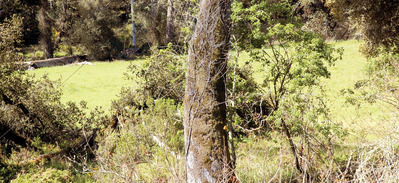A bill that would make it easier to form an open-space district in Santa Cruz County is facing opposition from the Scotts Valley City Council and the California and Santa Cruz local agency formation commissions, among other groups.
The bill working its way through the state Legislature — Senate Bill 211, sponsored by Sen. Joe Simitian, D-Palo Alto — would allow county supervisors to place a measure on the ballot to create an open-space district in Santa Cruz County.
However, the Scotts Valley council unanimously passed a resolution to oppose the bill, and the county LAFCo panel voted 5-2 to oppose it.
“My thought is there is a process in place already for the formation of special districts, and it’s called LAFCo,” said Jim Rapoza, a LAFCo commissioner who represents the San Lorenzo Valley Water District.
Rapoza says the Land Trust of Santa Cruz County — which helps preserve open space in the county and is heavily involved with the creation and support of SB 211 — does valuable work in the county. But he contends that SB 211 has nothing to do with the viability of an open-space district but rather the process of forming the district.
“I think the LAFCo process allows us to flesh proposals out to the point where the public has a good understanding of what is being proposed,” Rapoza said.
The California Association of LAFCos also opposes the bill.
“The only reason CalLAFCo are opposing it is because it circumvents LAFCo law,” said Roger Anderson, the chairman of the CalLAFCo board and the public member of Santa Cruz LAFCo.
Besides a series of public hearings, the commission’s process requires a petitioner to provide a funding source for a proposed district — a task the bill leaves to county supervisors to determine after the district is created.
Land Trust representative Stephen Slade said the bill would allow the public to decide whether to create a district and then how to fund it in separate ballot measures, rather than leaving the decision up to LAFCo.
“We sought special legislation to address unique circumstances,” Slade said.
Slade said LAFCo would be unlikely to allow the creation of the district as the proposal is formed.
The text of the bill includes an unusual provision that prohibits the district from using the power of eminent domain, except when approved by the landowner.
The amendment is in the bill to satisfy the agricultural community, primarily in Watsonville, which is concerned that farmland could be bought as open space, Slade said.
The bill also honors Watsonville’s Measure U, which sets limits on the city’s growth.
However, LAFCo commissioners see it differently.
Donna Lind, a Scotts Valley City Council member and a local LAFCo commissioner, also worries about the cost of setting up a new district and maintaining land the district purchases.
“Why create more bureaucracy?” Lind asks.
“Right now, we have a process — they can go before LAFCo,” she continued. “It is a real opportunity for the public to be involved and be heard. With this change, there wouldn’t be the public involvement.”
The Santa Cruz County district proposed by the Senate bill would be similar in design to the Monterey Peninsula Regional Parks District, in that it would enable a board of directors to propose bond measures or taxes to purchase land that would remain as open space.
Slade said polls two years ago showed that a sales tax increase was the funding mechanism voters would probably support most.
“Sales tax is the most likely, but a lot has happened in the past two years” Slade said. “You would not go ahead with a tax measure without two-thirds support (from the taxpayers).













